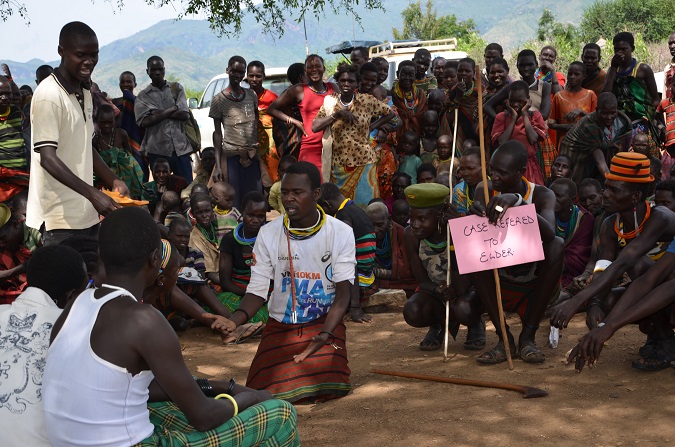Working with Karamajong Elders for gender equality in Uganda
Date:

Youth conduct a role play session on the conduct of the elders during the community session. Photo: UN Women/ Aidah Nanyonjo
For more than a decade, 39-year-old Harriet Nakoru endured insults and physical abuse from her husband. Every evening, he would come home inebriated and noisy before unleashing his fury onto her. According to Harriet, issues such as delays in opening the door or serving food to him would earn her serious beatings.
Harriet explains,
“He always complained that I was big-headed and that he wanted to instill manners in me. It was our neighbors that always came to my rescue. On several occasions my family members intervened but nothing changed. For all this time, I lived a miserable life. I feared separating from him because I was not sure of life outside marriage. I was also ashamed of being blamed for failing to keep my marriage. At the same time, my parents could not afford to refund bride price to him.”
One day as her husband tried to beat her, Harriet fled the matrimonial home and sought refuge at a friend’s place in the same neighborhood. When her husband became aware of her relocation, he followed her and beat her up. Harriet’s friend reported the incident to the elders’ council. The elders held a series of mediation meetings between Harriet and her husband.
After the mediations Harriet’s husband agreed never to beat her again. “He paid the fine of a goat. Since then, he has never raised a hand at me and we are now living peacefully,” reported Harriet.
Owing to the challenges in getting cases prosecuted through the formal justice system and the high cost of sustaining legal action, rural women prefer to seek help for dispute resolution from community leaders and elders who are easier to access. Based on the ‘Karamojong Cultural Principles’ and the ‘Administering Traditional Justice in Acholi: Case Management Handbook’, UN Women has strengthened the capacity of non-formal justice actors to deliver gender responsive dispute resolution alongside their cultural and religious practices and in line with national and international law.

Topoth speaks at the community dialogue. Photo: UN Women/ Aidah Nanyonjo
With funding from the Embassy of Sweden, UN Women in partnership with FIDA (The Uganda Association of Women Lawyers) is implementing a programme on enhancing Access to Justice for women and girls in the Kaabong and Moroto districts. The programme has supported special court sessions for handling gender-based violence, legal education on Violence Against Women and Girls (VAWG) and mobile legal aid clinics and referrals.
As part of the referral system 120 cultural leaders and elders were trained and integrated into the programme to mediate and sensitize communities on ending violence against women and girls (EVAWG).
Charles Topoth, 52, is one of the trained Karamajong elders. He said that most VAWG cases including early marriage, domestic violence, land grabbing and widow inheritance cases are mediated by elders at the zonal level. Sub-counties were divided into zones and each zone is headed by an elder whose role is to sensitize, record, mediate and refer cases. However, capital cases such as sexual violence and murder are beyond their jurisdiction and are referred to the nearest police station.
Case management books were availed to the elders, where cases are recorded and evaluated at the end of each month. “Every month, we evaluate the cases to find out which cases are most prevalent and which ones have been managed or referred for other services,” Topoth said.
VAWG cases found to be most prevalent are reported to FIDA Uganda which organizes community outreach to sensitize the community on causes of VAWG, solutions and how to access justice.
Due to their cultural roles, elders can pass over EVAWG messages as well as mediate them without facing resistance from communities. They work in partnership with local council leaders, police and courts. Sometimes courts of judicature invite elders to guide them on assessing VAWG cases during court sessions, particularly those that were referred by them.